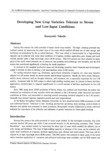Developing New Crop Varieties Tolerant to Stress and Low-Input Conditions
JIRCAS international symposium series
| ISSN | 13406108 |
|---|---|
| 書誌レコードID(総合目録DB) | AA1100908X |

本文フルテキスト
intlsymp-9_1-8.pdf201.95 KB
During this century the yield potential of many cereal crops trebled. The high- yielding potential was realized mainly by improving the plant type of the crops which enabled efficient use of solar energy and fertilizers as symbolized by the so-called ideotype. This type which is characterized by a high-yielding capacity can be achieved only under ideal conditions of irrigation, fertilizer application, pest, disease and weed control, namely under a high input-high return (H-H) system. This RH system has been adopted in many parts of the world where intensive use of resources was possible and technology was available, and the H-H system has contributed significantly to feeding the world population.
In contrast, in the marginal production areas and developing countries where financial and technological supply is limited, we have to develop a low input-medium return (L-M) system.
For saving resources input, e.g., fertilizers, agricultural chemicals, irrigation, etc., new crop varieties adapted to L-M system should be stress-tolerant and fertilizer-responsive. Beside the biotic stress tolerance, abiotic stress tolerance such as drought tolerance, salt tolerance, etc. is especially important for the L-M system. Compared with the H-H system in which high-yielding varieties must be tolerant to heavy fertilizer application, varieties have to respond significantly to a small amount of fertilizer application in the L-M system.
Since 1988, using about 10,000 accessions of barley, wheat, rice, soybean and buckwheat, the author has conducted an evaluation of crop varieties which are adapted to the L-M system under semi-arid and saline conditions in China, and succeeded in selecting several promising varieties adapted to the L-M system. Generally they showed vigorous vegetative growth and were stress-tolerant.
At the Barley Germplasm Center, Okayama University, we have preserved about 8,000 accessions of wild and cultivated barley. Tolerance to salt, flooding, pre-harvest sprouting, deep seeding, several kinds of diseases and aphids was evaluated in these accessions. Remarkable varietal differences in stress tolerance indicated the importance of the collection and utilization of genetic resources for future plant breeding.
In contrast, in the marginal production areas and developing countries where financial and technological supply is limited, we have to develop a low input-medium return (L-M) system.
For saving resources input, e.g., fertilizers, agricultural chemicals, irrigation, etc., new crop varieties adapted to L-M system should be stress-tolerant and fertilizer-responsive. Beside the biotic stress tolerance, abiotic stress tolerance such as drought tolerance, salt tolerance, etc. is especially important for the L-M system. Compared with the H-H system in which high-yielding varieties must be tolerant to heavy fertilizer application, varieties have to respond significantly to a small amount of fertilizer application in the L-M system.
Since 1988, using about 10,000 accessions of barley, wheat, rice, soybean and buckwheat, the author has conducted an evaluation of crop varieties which are adapted to the L-M system under semi-arid and saline conditions in China, and succeeded in selecting several promising varieties adapted to the L-M system. Generally they showed vigorous vegetative growth and were stress-tolerant.
At the Barley Germplasm Center, Okayama University, we have preserved about 8,000 accessions of wild and cultivated barley. Tolerance to salt, flooding, pre-harvest sprouting, deep seeding, several kinds of diseases and aphids was evaluated in these accessions. Remarkable varietal differences in stress tolerance indicated the importance of the collection and utilization of genetic resources for future plant breeding.
| 作成者 | Kazuyoshi Takeda |
|---|---|
| 公開者 | Japan International Research Center for Agricultural Sciences |
| オンライン掲載日 | |
| 号 | 9 |
| 開始ページ | 1 |
| 終了ページ | 8 |
| 言語 | eng |
